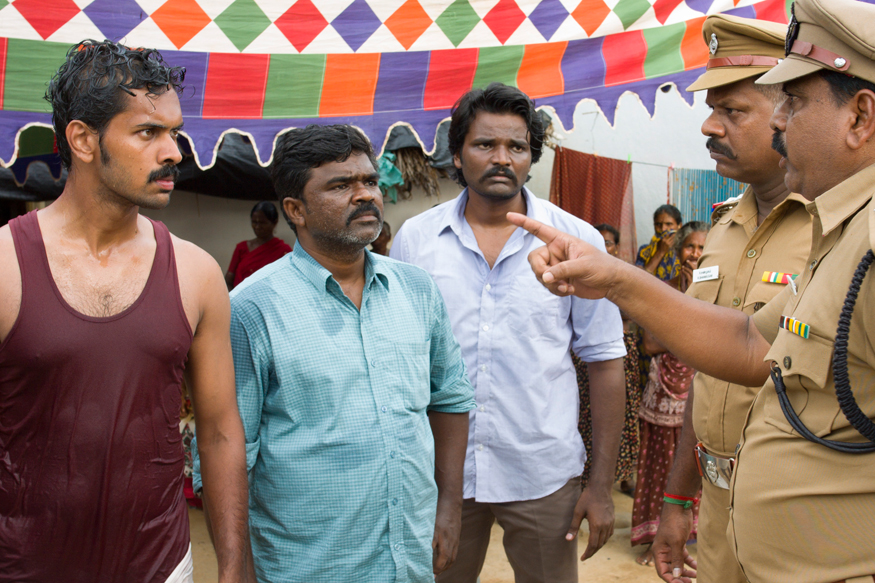Cairo Film Festival: Tamil Film Manusangada Highlights a Grave Social Injustice
India may be making a big noise about open defecation and lack of toilets in villages (remember the Akshay Kumar film, Toilet: Ek Prem Katha?), but Amshan believes that lack of adequate burial places and proper roads leading to them is a more complex and pressing issue for Dalits.

Amshan Kumar's Tamil work, Manusangda (Cry Humanity) – screened on Tuesday at the Cairo International Film Festival – could not have arrived at a more appropriate time. In the context of what is being perceived as the blatant disregard of a court verdict in the case of Sanal Sasidharan's S Durga at the just ended International Film Festival of India in Goa's Panaji, Manusangada gains enormous significance. It also talks about how a Madras High Court order is flouted with impunity in a small Tamil Nadu village. Of course, but of course, Manusangada details a far, far more serious issue – of Dalit discrimination, a kind of prejudice which India has been witnessing for centuries.
I remember my mother saying how in a Kerala village, where she grew up in the 1930s, the upper caste Hindus would not even want the shadow of a Harijan ( now Dalit) to cross their path. So terrifying was the rigidity of this social barrier.
And as the director, Kumar, tells me during a chat here in Cairo that while such intolerance in America is visible since it exists between the blacks and whites, it is devious and hidden in India. For, nobody can really tell the difference between a Dalit and a high-caste or higher-caste Hindu. They all look the same. So, the hatred which exists between these two sections, Dalits and non-Dalits is camoflouged, and often the injustice perpetrated by one on the other is very well disguised.
Manusangada, based on a real 2016 incident in a village not very far from Chennai (with its educated elite and cosmopolitan crowds), narrates the story of a youth, Kolappan (played by Rajeev Anand), who is woken up one morning with the news of his father's death. He rushes from Chennai, where he is working, to his home to meet his grieving mother and perform the last rites.
But what shakes him more than his father's untimely death is the social obstacle placed by caste Hindus on the road to the burial ground. Although the Dalits are free to use the main thoroughfare in their day-to-day activities, they are forbidden to take their dead along this road. Instead, they have to use a rough path, strewn with thorns and wild plants, to carry their dead bodies to the burial place.
This has been a perennial problem in the village (and in many other villages), and the Government's assurance to lay a proper road for the Dalits has remained on the drawing board.
Kolappan, young and haughty and full of modern ideas, decides that he will take his father's body only through the main thoroughfare, and when hostility and protests raise their ugly heads, he moves the Madras High Court with a writ. The court understands his displeasure at such divisiveness, and orders the village administration and the police to make sure that Kolappan's father gets a decent burial.

But he does not, with both the police and the administration conniving with the higher castes, and making sure that the funeral procession does not use the main road. Not just this, when the cops find Kolappan and his people defiantly offering resistance, the men in uniform arrest them and carry the corpse – and bury it in an undisclosed grave!
Kumar says that the young man has to this date not been able to identify his father's grave!
Essentially a documentary moviemaker, Kumar's enduring passion has been the village. “I often visit villages in Tamil Nadu and elsewhere, and when I keep talking to the people there, I find that one of the most pressing problems in rural areas is lack of burial sites for Dalits and a proper path for them to carry their dead”.
India may be making a big noise about open defecation and lack of toilets in villages (remember the Akshay Kumar film, Toilet: Ek Prem Katha?), but Amshan believes that lack of adequate burial places and proper roads leading to them is a more complex and pressing issue for Dalits.
“For many years, Dalits bore all this inequity stoically. But the past five or six years have seen a greater awareness among the community, which is now rising against this kind social injustice”. Kumar avers.
He also feels that the mainstream media chases more glamorous kind of societal ills like honor killing. “Tell me how many stories have you read in newspapers or seen on television about this problem of ensuring a decent burial for the downtrodden?” the helmer asks me.
True, much as I tried, I really could not recall reading anything in the big newspapers about this.
But, yes, the judiciary appears active and concerned about such issues, as I saw in Manusangada – where the presiding judge makes a classic observation: They get no dignity when they are alive. At least, make sure they get it in their death.
But Kolappan's father gets a terrible burial. He is laid to rest by policemen with no member of his family present to bid the last good-bye. What an end!
More importantly, the verdicts of law courts are beginning to be disrespected more and more these days, a trend which seems disturbing.
But, as Kumar quips, “what do you do, when the enforcement authorities, the police, in particular, are hand-in-glove with the law-breakers”? Yes, what do you do!
(Author, commentator, and movie critic Gautaman Bhaskaran is now covering the Cairo International Film Festival)
Video Wall

Raftaar Raps For News18.com
 Live TV
Live TV
Recommended For You
 The Ashwin-Jadeja Debate, And Final Frontiers
The Ashwin-Jadeja Debate, And Final Frontiers WWE Star John Cena and Shane Watson Have a Ball Playing Cricket
WWE Star John Cena and Shane Watson Have a Ball Playing Cricket Haryana Leader Who Offered Rs 10 Crore for Beheading Deepika-Bhansali Resigns
Haryana Leader Who Offered Rs 10 Crore for Beheading Deepika-Bhansali Resigns Johnson and Pietersen Engage in Ugly War of Words on Twitter
Johnson and Pietersen Engage in Ugly War of Words on Twitter![Maruti Suzuki Urges All Car Occupants to Wear Seat belt, Unveils 'PehniKya' Campaign [Video] Maruti Suzuki Urges All Car Occupants to Wear Seat belt, Unveils 'PehniKya' Campaign [Video]](http://img01.ibnlive.in/ibnlive/uploads/90x60/jpg/2017/11/DN2TvrWV4AE80Fq.jpg) Maruti Suzuki Urges All Car Occupants to Wear Seat belt, Unveils 'PehniKya' Campaign [Video]
Maruti Suzuki Urges All Car Occupants to Wear Seat belt, Unveils 'PehniKya' Campaign [Video]



 4-min read
4-min read